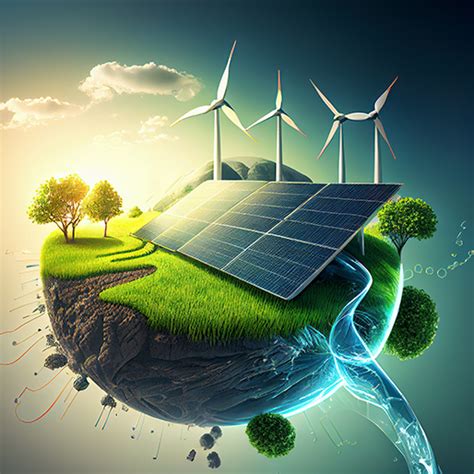The world is facing numerous environmental challenges, from climate change and pollution to deforestation and biodiversity loss. To mitigate these issues, it is essential to adopt sustainable practices and leverage technology to reduce our ecological footprint. Earth tech solutions are becoming increasingly important in promoting a sustainable environment and ensuring a livable future for generations to come.
As the global population continues to grow, so does the demand for resources, energy, and infrastructure. However, this growth often comes at the expense of the environment, leading to devastating consequences such as rising greenhouse gas emissions, water scarcity, and loss of natural habitats. To address these challenges, earth tech solutions are being developed and implemented to reduce waste, increase energy efficiency, and promote sustainable land use.
One of the most promising areas of earth tech is renewable energy. Solar, wind, and hydroelectric power are becoming increasingly cost-competitive with fossil fuels, making them more accessible to communities around the world. For instance, solar energy can power homes, schools, and businesses, reducing reliance on coal and gas. Moreover, advancements in energy storage technology are enabling the widespread adoption of renewable energy sources, making it possible to store excess energy for later use.

Earth Tech Solutions for Sustainable Agriculture
Agriculture is another critical sector where earth tech solutions can make a significant impact. Sustainable agriculture practices, such as regenerative agriculture and precision farming, are being developed to reduce the environmental footprint of food production. These approaches focus on improving soil health, conserving water, and reducing synthetic fertilizers and pesticides.
For example, precision farming uses advanced technologies like drones, satellite imaging, and artificial intelligence to optimize crop yields, reduce waste, and promote sustainable water management. Similarly, regenerative agriculture practices like no-till or reduced-till farming and cover cropping can help sequester carbon, improve soil health, and support biodiversity.

Waste Reduction and Management
Waste reduction and management are essential components of a sustainable environment. Earth tech solutions are being developed to minimize waste, increase recycling rates, and promote the use of biodegradable materials. For instance, advanced recycling technologies can convert plastic waste into fuels, chemicals, and other valuable products.
Additionally, the use of biodegradable materials, such as bioplastics and compostable packaging, can reduce the amount of waste sent to landfills. These materials can easily decompose, reducing greenhouse gas emissions and minimizing environmental pollution.

Earth Tech Solutions for Climate Change Mitigation
Climate change is one of the most pressing environmental challenges of our time. Earth tech solutions can play a crucial role in reducing greenhouse gas emissions and mitigating the impacts of climate change. For example, carbon capture and storage technologies can reduce emissions from industrial sources, while advanced weather forecasting and climate modeling can help communities prepare for and respond to extreme weather events.
Moreover, earth tech solutions can promote sustainable land use practices, such as reforestation and afforestation, which can help sequester carbon dioxide from the atmosphere. Additionally, climate-resilient infrastructure, such as sea walls and levees, can protect communities from the impacts of sea-level rise and extreme weather events.

Water Conservation and Management
Water is a precious resource that is essential for human life and economic development. Earth tech solutions can help conserve and manage water resources more efficiently. For instance, advanced water treatment technologies can remove pollutants and contaminants from wastewater, making it safe for reuse.
Additionally, precision irrigation systems can optimize water use in agriculture, reducing waste and minimizing the environmental impacts of water extraction. Furthermore, water-efficient appliances and fixtures can reduce water consumption in homes and businesses, promoting water conservation and sustainability.

Earth Tech Solutions for Sustainable Cities
Cities are hubs of economic activity, innovation, and cultural diversity. However, they are also major contributors to environmental pollution and climate change. Earth tech solutions can help create more sustainable cities by promoting green infrastructure, reducing energy consumption, and increasing waste management efficiency.
For example, green roofs and walls can reduce urban heat islands, improve air quality, and provide habitats for urban wildlife. Additionally, smart traffic management systems can reduce congestion, promote public transportation, and decrease air pollution.

Benefits of Earth Tech Solutions
Earth tech solutions offer numerous benefits for the environment, human health, and the economy. Some of the key benefits include:
- Reduced greenhouse gas emissions and climate change mitigation
- Improved air and water quality
- Increased energy efficiency and reduced waste
- Promoted sustainable land use and conservation of natural resources
- Enhanced public health and well-being
- Economic benefits through job creation and innovation

Conclusion
Earth tech solutions are critical for promoting a sustainable environment and ensuring a livable future for generations to come. By leveraging technology and innovation, we can reduce waste, increase energy efficiency, and promote sustainable land use practices. It is essential to adopt these solutions and work together to mitigate the environmental challenges facing our planet.
As individuals, we can make a difference by adopting sustainable practices, reducing our energy consumption, and promoting earth tech solutions in our communities. By working together, we can create a more sustainable future for all.






What are earth tech solutions?
+Earth tech solutions are technologies and innovations that promote sustainability and reduce environmental impacts.
How can earth tech solutions benefit the environment?
+Earth tech solutions can reduce greenhouse gas emissions, improve air and water quality, and promote sustainable land use practices.
What are some examples of earth tech solutions?
+Examples of earth tech solutions include renewable energy, sustainable agriculture practices, waste reduction technologies, and water conservation systems.
